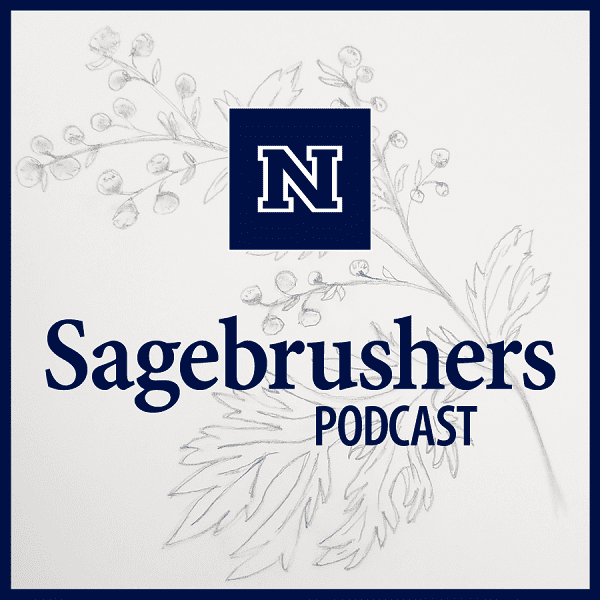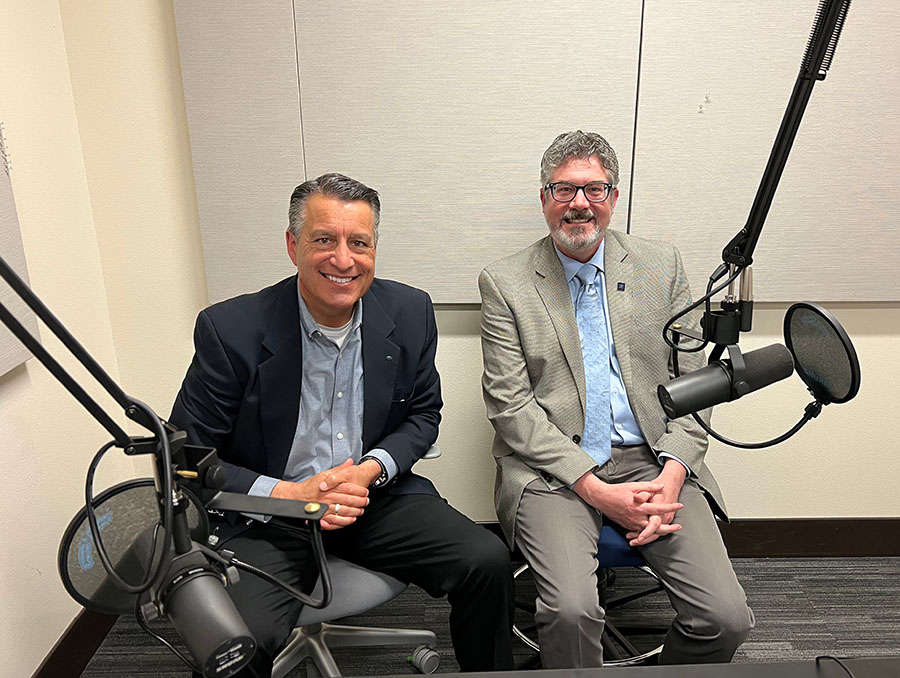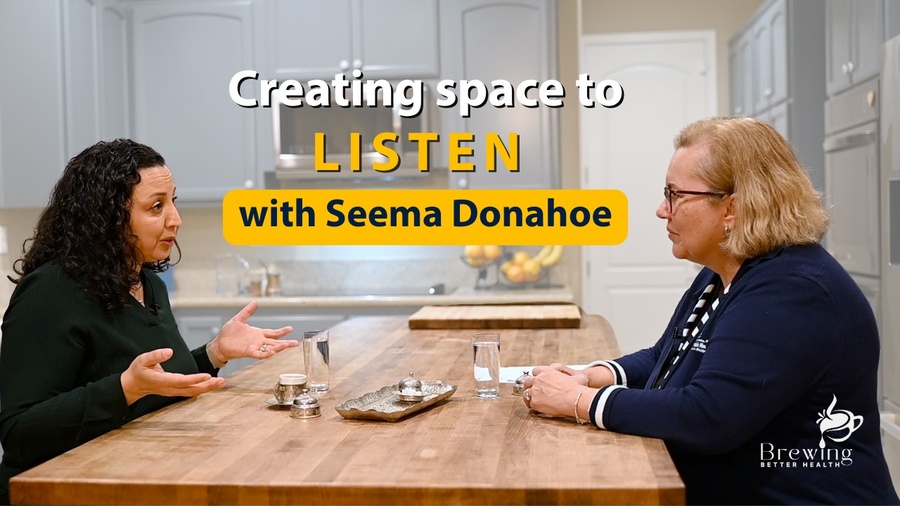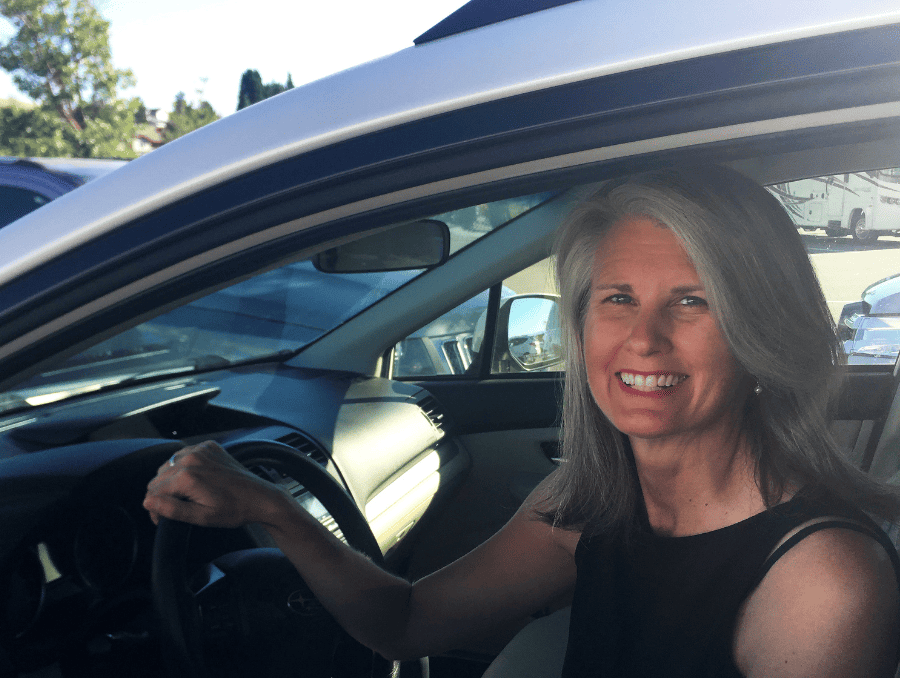
In Sagebrushers season 2 episode 8, University of Nevada, Reno President Brian Sandoval chats with Dr. Peter Reed, director of the Sanford Center for Aging. The Sanford Center, which is celebrating its 30th anniversary, enhances the quality of life and well-being among Nevada's elders through research, education and community outreach.
During the episode, Sandoval and Reed discuss the programs and services offered by the center, the center’s efforts to provide support for elders around the state and important insights regarding the aging process. They also highlight the legacy of Graham and Jean Sanford, who founded the center in 1993, and the center’s plans to honor its 30th anniversary this year.
Sagebrushers is available on Spotify, Apple Podcasts and other major podcast platforms, with new episodes monthly.
Sagebrushers – S2 Ep. 8 – Director of the Sanford Center for Aging Peter Reed
Join host President Brian Sandoval as he and Director of the Sanford Center for Aging Peter Reed discuss the programs and services offered by the center, important insights regarding the aging process, the legacy of Graham and Jean Sanford, who founded the center in 1993, and the center’s plans to honor its 30th anniversary this year.
Dr. Peter Reed: So, we really encourage people to embrace their own aging and to remain engaged in the community and to recognize that with the right supports, people can live the life that they choose every day of their life until the end of their life.
President Brian Sandoval: In this episode of Sagebrushers, we welcome Dr. Peter Reed, the director of the Sanford Center for Aging at the University of Nevada, Reno School of Medicine. I'm Brian Sandoval. I'm a proud graduate and president of the University of Nevada, Reno, and I'm your host of Sagebrushers. Dr. Reed is a nationally recognized public health gerontologist who has spent his career working to support the health and quality of life for older adults and people living with dementia. He's been with the University of Nevada, Reno for nearly 10 years, during which time the Sanford Center has dramatically expanded its community impact and national reputation. Dr. Reed is the current chair of the Nevada State Task Force on Alzheimer's Disease and serves on the Independent Advisory Board of the Northern Nevada State Veterans Home. Today's podcast is being recorded at the Reynolds School of Journalism on our University's campus. Dr. Reed, welcome to Sagebrushers. It's a pleasure to have you on the podcast.
Reed: Thank you very much, President Sandoval. I'm delighted to be here and look forward to talking about the Sanford Center for Aging.
Sandoval: Yeah, it's gonna be a great conversation. So, this year the Sanford Center for Aging is celebrating 30 years serving Nevada's Elders. So, for our listeners who aren't familiar with the Sanford Center, can you tell us about your mission and impact?
Reed: Absolutely. So, the Sanford Center for Aging, as you mentioned, is celebrating its 30th anniversary. We were founded in 1993 here at UNR as a community-facing aging services organization connected to an academic environment to support the translation of research into practice. So, our mission is where it all starts for the Sanford Center for Aging, and that is to enhance the quality of life and well-being of Nevada's elders through translational research, education and community outreach. And we do that in a variety of different ways. First and foremost are our community supports and services that we offer. And we have a large portfolio of programs that are delivering supports to enable elders to live well in the community, to remain independent, to stay engaged in the activities that they enjoy and really to experience a high quality of life. We also offer a variety of clinical services and also education programs both for professionals as well as for students here at UNR and adults out in the community. And ultimately it comes back to that mission and to the legacy that was established with the Sanford Center for Aging in serving the community and ensuring that we're having a high impact on the well-being of Nevada's elders.
Sandoval: No, and that, that's amazing and I'm so grateful that we have a resource on this campus and a leader like yourself. So, will you talk a little bit more specifically about the programs that you offer?
Reed: A lot of people, as they age, start to experience a variety of changes, maybe it's related to chronic conditions or perhaps to some cognitive changes, and they're able to live well if they receive the support that they need to do so and are able to accommodate those changes over time. We have one program called Senior Outreach Services or SOS. This is funded by the State of Nevada and delivers one-on-one in-home companionship and support for low-income elders here in Washoe County. And that's driven by volunteers. So, we have volunteers that go and spend time with people in their homes to be sure that they have the socialization that they need or maybe give them a ride to an activity or to the grocery store and really just reducing the burden of loneliness and isolation in a way that helps them stay connected to the community.
Reed: Similarly, we offer a volunteer transportation program. So, we have our own van, and we also have volunteers who use their own personal vehicles and give elders who are in need of rides from point A to point B to get them where they need to be. We also offer a program called Medication Therapy Management, and through that program, we have a certified geriatrics pharmacist that does a comprehensive review of all the medications that someone may be taking and looks for potential negative interactions between those or perhaps some medications that they no longer need and are appropriate. Similarly, we offer a geriatrics clinical program that brings together a medical provider with a clinical social worker with a clinical pharmacist. And it's a really amazing experience. The patients tell us all the time because they're not used to having people who listen or providers who listen to them, and our team spends about an hour and a half to two hours with each patient and really digs deep to get to know everything that's happening in terms of their medical needs, but also their psychosocial needs, their living environment. And that makes recommendations for how to best meet those needs.
Sandoval: How many clients do you have? How many elders do you have that you serve?
Reed: Right. Taken in total, when we look across all of our different community service programs, our clinical programs, our education programs, annually, we touch about 5,000 elder lives in our community and across Nevada.
Sandoval: So, in that you anticipated my next question. So, this isn't limited to Washoe County?
Reed: That's right. It's interesting and the nature of the work that we do is that the people that we serve are largely determined by our funding sources. So, we'll receive grants that specify we serve Washoe County for one particular grant or another grant that specifies we serve the larger state, or we'll get a gift perhaps from a generous donor who wants us to serve the rural communities, and so, it really depends on the program, but what I would say is that since the pandemic when we shifted everything online, we've kind of decided not to look back from that. So, we have of course, returned to our in-person programming that’s available here in the Washoe community. But now we’re offering everything online as well to extend our reach and to really try to serve rural Nevadans.
Sandoval: You know, some of our elders may not have access to technology and you have this amazing programming. So, where do they go to learn more about the Sanford Center?
Reed: Yeah, there's a couple of different ways that people can get connected to the resources at the Sanford Center. Certainly, for those that do have access to technology, our website is a great resource for that and that's at med.unr.edu/aging. But for those who need to connect in other ways, beyond the internet, we do have a phone number that they can call and get connected with one of our team members at the Sanford Center. So that number is (775) 784-4774. And I also encourage folks to explore the resources beyond the Sanford Center for Aging, if you will. There's a statewide aging services network that we are partners with, and many of those resources can be accessed through 211, which is a great non-emergency number that people can call to get information and referral to various community programs, and particularly for elders that connects them with the Nevada Care Connections program through the state, which maintains a database of all community resources.
Sandoval: So, you talked about all the services provide, but you also mentioned that you have an educational component, so you chat a little bit about that.
Reed: Absolutely. We do offer health education programs to elders in the community, really focused on their health and wellness. So, things such as diabetes self-management, chronic pain self-management, fall prevention programs, a variety of things that give people the knowledge and the skills and the tools that they need to better manage their own conditions so that they're not just relying on a healthcare provider to meet their needs there, but that the patient can be involved in taking control. We also offer professional education programs and we're fortunate to have a program that was funded by the U.S. Health Resources and Services Administration. We call it ICECAP Nevada, which stands for Improving Care of Elders through Community and Academic Partnerships. Every program needs a good acronym. Right?
Sandoval: That's a good one.
Reed: And so ICECAP Nevada delivers geriatrics training to current and future primary care providers. We've recognized that with the aging of the population, unfortunately, there's no way we're gonna be able to train enough geriatrics specialists to meet the needs that we expect over the coming decades. And so, we've kind of pivoted and started putting a focus into making sure that all healthcare providers have some basic level of competence in serving their older patients. We also have adult education programs and our signature initiative there is OLLI, or the Osher Lifelong Learning Institute. And OLLI is a fantastic opportunity for elders in the community to participate in education, different talks and different social engagement opportunities. That is, I think, the only program within the Sanford Center that is not completely free. There is an annual registration fee of $85 per year, and for that, elders are able to participate in a big catalog full of programs. They run about five to nine education programs per day and have about 1,100 members in our community right now. So, we're a really vibrant opportunity for adult education and continued learning, which is so important for so many people.
Sandoval: No, that's great. My mom is one of those 1,100. So, Mom, if you're listening, thank you, but that, that's wonderful. So, let’s go back to the beginning and talk about how the Sanford Center was founded and how you continue to honor the legacy of Graham and Jean Sanford.
Reed: So, Graham and Jean Sanford are legendary Nevadans, and they had a stake in the Dangberg Ranch out in Minden, and during the elder years of Jean's mother, they experienced difficulty kind of navigating the system of support that she needed as she aged and developed some physical needs. They tried to access various programs and services and just couldn't really find what they needed. And so, Graham and Jean made a commitment to launch an opportunity for future elders not to have that same kind of experience. And so, they worked with the University and established the Sanford Endowment as an estate gift. So, when they passed, they made a gift to the University of nearly $8 million. And at that time, it was the largest single gift the University had ever received, and they dedicated those funds to launching the Sanford Center for Aging with a mission of service to community elders and ensuring that people would have the resources that they needed to navigate their elder years successfully and remain independent and well in the community. The Sanford Center for Aging has honored that legacy throughout its 30-year history by remaining committed to developing and delivering all of the community supports and programs that I mentioned previously.
Sandoval: That's amazing. And, and what a gift. I mean, what a wonderful, wonderful gift. So, what do you want people to know and understand about the aging process?
Reed: Great question. I'll start with what I hope people can overcome in terms of their perceptions of aging. In my view as a career public health gerontologist, we live in a culture and a society that is scared of the aging process, and there's a lot of stigma, a lot of fear. And ultimately that translates into what we in the field call ageism, which is just like other of discrimination, making assumptions about a person based on the group that they're a part of. And that ageism can directly diminish the quality of life for older adults. And unfortunately, because aging is an experience that we all share, some people internalize that ageism and kind of limit themselves because of their aging process. And I'm here to tell you that that does not have to be the case, that aging as a biological and a social process are natural, normal life progressions.
You can think about elderhood, if you will, just like childhood or adulthood in that it is a normal natural life stage in which there are continued opportunities for growth and development and community engagement and meaning and purpose and joy that elders can live well. Now that said, yes, there may be changes that come along with that. You may develop chronic conditions, may develop cognitive issues, may develop some frailty and some difficulty walking, but we believe in the field of aging services that if people are provided with the right supports and services, that they can live well the, despite the normal changes that come along with the aging process. So, we really encourage people to embrace their own aging and to remain engaged in the community and to recognize that with the right supports, people can live the life that they choose every day of their life until the end of their life.
Sandoval: That's fantastic. So, we're coming up on time, but I'd love to know how will you'll be celebrating the Sanford Center's 30th anniversary.
Reed: Absolutely. So, from 1993 to 2023, the Sanford Center for Aging has been supporting elders in living well in Nevada. And so, for our 30th anniversary, we're gonna have a whole year of celebrations. It starts, or started with, the launch of a new brand. So, we have a new logo that we're using just for this year, for our 30 years, and we talk about 30 years of aging well in Nevada. And we'll be putting that out into the community and putting it all over our materials. And then in the fall, we're going to have a couple of distinguished speaker events. The one that we have nailed down so far is for September 21, Dr. Jerry Hurwitz, who's a nationally recognized geriatrician and researcher, will be joining us for that event. And then in November, we're working on setting one up, which will intersect with UNR’s sesquicentennial and the 150th anniversary for our parent institution. So, really excited about everything that's happening with the 30th anniversary and proud of the work that we've done over the last 30 years and look forward to the future.
Sandoval: Well, thank you for your enthusiasm and thank you for your service. But unfortunately, that is all the time we have for this episode of Sagebrushers. And again, thank you for joining us today, Dr. Reed. And join us next time for another episode of Sagebrushers, as we to tell the stories that make our university special and unique. Until then, I'm University President Brian Sandoval. Go Pack.
















